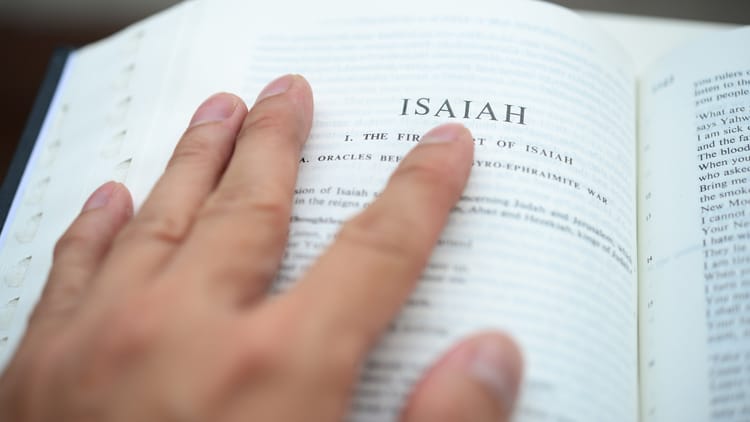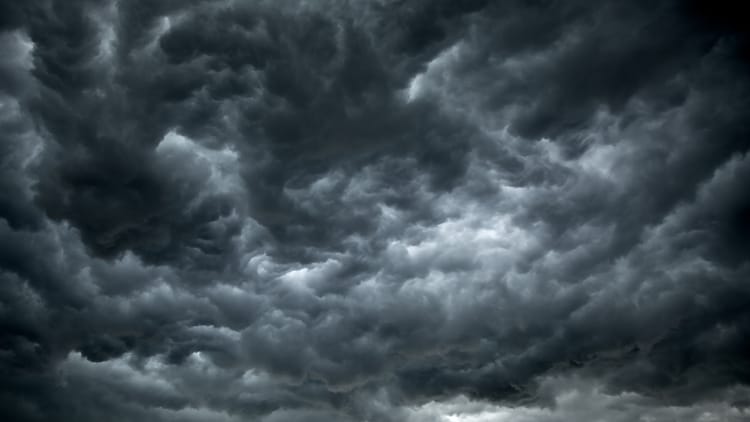In Whom Do You Trust? (Isaiah 7-9)

I really value self-reliance in others. I love stories of people who dig down deep and persist against the odds and prevail. I’m a sucker for movies like this, and I’m impressed if you’re a person who’s dependable and self-reliant.
That’s why I love the story of the English Victorian poet William Ernest Henley. He fell victim to tuberculosis of the bone at the age of 12. After a while, the disease reached his foot. Doctors said that to save his life, they had to amputate just below the knee. It was amputated when he was 25. In 1875, he wrote the “Invictus” poem from a hospital bed. You’ve heard this poem:
Out of the night that covers me,
Black as the pit from pole to pole,
I thank whatever gods may be
For my unconquerable soul.
In the fell clutch of circumstance
I have not winced nor cried aloud.
Under the bludgeonings of chance
My head is bloody, but unbowed.
Beyond this place of wrath and tears
Looms but the Horror of the shade,
And yet the menace of the years
Finds and shall find me unafraid.
It matters not how strait the gate,
How charged with punishments the scroll,
I am the master of my fate:
I am the captain of my soul.
I love stories like this. Who doesn’t like to have that kind of self-reliance and determination to make it on their own terms? The problem is, according to the Bible, that self-reliance could destroy you. And surprisingly, it takes a baby born on Christmas morning to teach us that it’s fatal to rely on ourselves. Our only hope is to rely on, of all things, a baby sent by God.
Relying On Ourselves
Let me back up a little. This evening, I want to give you an overview of a message from God given to someone who was facing this very issue.
The date is 735 B.C. King Ahaz has just begun his reign in Judah. A young individual finds himself confronted by the perilous challenges in Syria and Northern Israel. The question is: how is he going to respond to these threats? Will he trust in God for deliverance, or will he put his faith in other nations?
Listen to what happened. Isaiah 7:2 says:
Now the house of David was told, “Aram has allied itself with Ephraim”; so the hearts of Ahaz and his people were shaken, as the trees of the forest are shaken by the wind.
When Ahaz – the house of David – heard about the alliance of Aram and Ephraim (Syria and the northern kingdom), he panicked. He didn’t have to. In fact, in verse 4 God says:
Be careful, keep calm and don’t be afraid. Do not lose heart because of these two smoldering stubs of firewood–because of the fierce anger of Rezin and Aram and of the son of Remaliah.
However, Ahaz did not let that deter him. He did panic. Tragically, Ahaz chose to put his trust in Assyria, his worst enemy. Essentially, he lay aside trust in God and compromised his nation’s unique identity. Instead of being distinct and becoming a blessing to the nations, Judah loses its identity and becomes enslaved.
In chapters 7, 8, and 9, God, through the prophet Isaiah, keeps coming after Ahaz: Will you trust in God, or will you put your trust in something else? And hear this: Isaiah says that if we trust in God we will be saved. But whatever we trust in place of God will eventually turn on us and destroy us. Let me say that again: whatever we trust in place of God will eventually turn on us and destroy us.
You get to the end of chapter 8, and it’s a pretty dark picture. People are consulting mediums and spiritists instead of God. They end up distressed and hungry, cursing the king and God. “Then they will look toward the earth and see only distress and darkness and fearful gloom, and they will be thrust into utter darkness” (Isaiah 8:22).
Do you see what God is saying through Isaiah? Self-reliance, and reliance on others, is deadly. It will lead you to put your trust in the very thing that will kill you. It’s like taking medicine that actually turns out to be poison. Self-reliance – making it on our own terms – is deadly, Isaiah is telling us, and it will destroy us.
Listen to me this evening. You’re not Ahaz, but tonight we all face the same question: In whom do you trust? I’ve found it easy to put my trust in the opinion and help of others, or in certain relationships we have – our spouses, our kids, our networks. I know some who feel secure when their bank account reaches a certain level. Others – and it’s clear this isn’t me – are putting trust in maintaining our looks. It’s a losing battle against time. Others of us are putting our trust in our resume. Isaiah is asking us to confront this question, and he’s warning us: whatever we trust in place of God will eventually turn on us and destroy us.
Relying on a Baby
If this is true, how do we come to trust in God? Twice in these chapters, Isaiah gives us a surprising alternative to trusting in anyone but God. But it’s not what you’d expect. In chapter 7, Isaiah challenges Ahaz and Judah to put God to the test to prove that he’s reliable, that he will destroy the two kings that are threatening him. Ahaz refuses, probably because his mind is made up. But despite his refusal, God offers him a sign:
Therefore the Lord himself will give you a sign: The virgin will conceive and give birth to a son, and will call him Immanuel. (Isaiah 7:14)
What is Isaiah saying here? The failure of the earthly king to rely on God means that God will send a baby born to a young woman of marriageable age. Before that son is old enough to know the difference between right and wrong, the opposing kings will be destroyed, but they will be replaced by an even worse invader: Assyria.
Who is this child? There are lots of options. One of the best options is the son that Isaiah had in the very next chapter (Isaiah 8:3). Isaiah names the child “sign-child” which is a pretty good hint that this is a fulfillment of the prophecy! This child being born is a sign that we can trust in God instead of relying on ourselves.
But that’s not the only time that the birth of a son comes up. In chapter 9, Isaiah once talks about a baby being born. Isaiah describes the birth of a wonderful child:
For to us a child is born,
to us a son is given,
and the government will be on his shoulders.
And he will be called
Wonderful Counselor, Mighty God,
Everlasting Father, Prince of Peace.
Of the greatness of his government and peace
there will be no end.
He will reign on David’s throne
and over his kingdom,
establishing and upholding it
with justice and righteousness
from that time on and forever.
The zeal of the LORD Almighty
will accomplish this.
(Isaiah 9:6-7)
God says we can trust him because of a baby born to a young woman, and now God says he can trust him because of a child who will take the world stage, who will be the king to end all kings. He will be “God with us” not only to deal with the Syrians, but he will be a King who delivers us from all threats, and who begins an endless rule of justice, righteousness, and peace. God himself will accomplish this. We don’t need to do it ourselves or rely on ourselves; God will do this for us.
Who is this baby? It turns out, actually, to be the same baby as the one Isaiah talks about in chapter 7. You see, chapter 7 probably does refer to Isaiah’s son, but it also turns out to refer to an even greater Son who was born. In Matthew 1:22-23 we read:
All this took place to fulfill what the Lord had said through the prophet: “The virgin will conceive and give birth to a son, and they will call him Immanuel” (which means “God with us”).
Jesus is the son who is a sign to us that we don’t have to rely on ourselves or to prop ourselves up with things that will destroy us. We can rely on God because his power is enough. And just so we’re sure, he sends us the sign of a baby born to a young woman of marriageable age. His name is Jesus.
And the child of Isaiah 9? In Luke 1:32-33 the angel says to Mary:
He will be great and will be called the Son of the Most High. The Lord God will give him the throne of his father David, and he will reign over Jacob’s descendants forever; his kingdom will never end.
Jesus is that child who is born who will deliver us. He’s the one who is sent by God and will save us, since we can’t save or rely on ourselves.
Isn’t it strange that in contrast to armies and kings, Ahaz is asked to look at a baby? Maybe not. Because we’re asked to do the same thing. Christmas is all about the message that it’s fatal to rely upon ourselves. Our only hope is to rely on, of all things, a baby sent by God.
Let’s pray.
We admire self-reliance. But the Bible teaches us that self-reliance is deadly. It will destroy us. Ahaz relied on kings and armies. We rely on our own strength, our money, our accomplishments, our relationships. Whatever we trust in place of God will eventually turn on us and destroy us.
God sent us a sign so that we would know we don’t have to rely on ourselves. That sign is Jesus. He is the King who is like no other, and his reign will never end.
Father, may we see Jesus tonight. May we rely not on ourselves but on him. May we put our hope not on human strength or power but in God-in-the-flesh, in the King who came to live and die and be raised again so that we could be saved. It’s that King we worship at Christmas, the King who now sits on the throne. In his name we pray. Amen.





